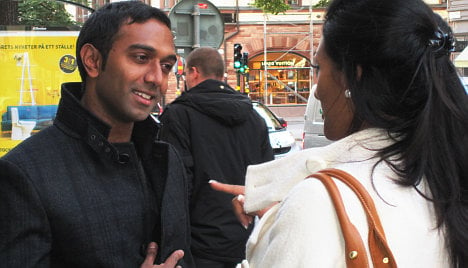”Excuse me. I just saw you across the road and had to come over and tell you how beautiful you are.” (Pause for response) ”What’s your name?”
Could this seemingly shifty chat-up line melt the hearts of Swedish ice maidens on a chilly afternoon in the capital?
I had my doubts. Jeremy Soul was eager to contest them, confident that his school of thought allows him to meet women any time and any place.
”I can help guys to get laid, to get girlfriends,” he says. “But what I’m teaching is control over their love life.”
For which he usually charges a day rate of $1,500 to $3,000. Soul is a respected PUA (pick up artist) in the seduction community – a male kinship which began in 80s America – exposed and explored by US journalist Neil Strauss in his 2005 book The Game.
On the outside he is a dating coach, who moved from England to Stockholm this year, and I catch up with him lending his expertise to a group of protégés. I, along with these men handpicked from across the world, am getting his services for free.
The students, chosen from 300 applicants, are taking part in Project Rock Star, an initiative set up by US company Love Systems to guide men on the road to success in the areas of health, wealth and relationships and lead the ultimate lifestyle.
Since paying clients prefer to shy away in anonymity, it’s also an opportunity to publicise their services.
“We train them for eight weeks in absolutely everything we know,” Soul adds. “Part of it is about picking up women but part of it is also about networking, physical wellbeing and entrepreneurship.”
AUDIO: The voice of seduction – Jeremy Soul speaks to Christine Demsteader about the mythology of love and the joys of life in Sweden
AudioPlayer.setup(“/scripts/player.swf”, { width: 468 });
AudioPlayer.embed(“audioplayer”, {soundFile: “http://dulh7fqljameo.cloudfront.net/JeremySoul.mp3”, titles: “Interview with Jeremy Soul”, loader: “CC6600”});
Aaron Panasbodi, 24, from Australia was considering joining a Thai monastery before radically changing direction. “It was the right time and place for me,” he says. “I have immediate access to a bunch of mentors for different areas of my life.”
A strict upbringing in a southern Baptist household “where Sarah Palin was preached,” led Joshua Votto, 24, to look for pastures new. “There was always something inside of me where I felt I could achieve greater things,” he says. “It’s been a long-time for me coming out of that; finding out who I was and making peace with that.”
Unsatisfied with his lot in life, Swedish participant Michel Genetay, 27, wanted more women and adventure. “I quit everything I had,” he says. “I moved away from the comfort and safety to challenge myself – that’s why I’m doing it.”
The day begins with a three-hour seminar, concentrating on techniques in approaching women wherever you are.
After all, Soul is said to be one of the best day-gamers in the business. A self-confessed love-shy geek during his teens, he sought out a system to woo women and won. Today, he is superbly confident for his 26 years and travels the world with his job. It first brought him to Stockholm two years ago.
“I realised it’s my favourite city in the world,” he says. “Part of it has to do with the women; they are more beautiful than anywhere else I’ve been.”
Defying the stereotype, brunettes are his weakness but to fall under the influence of Soul’s charm he prefers them sober. “I tell my friends that when Swedish girls drink they turn into English men – they can be quite predatory and it’s almost like a role reversal.”
That’s why Soul sticks to the day game. “I love women. I love emotional connection. I love good sex,” he says.
“But I don’t really enjoy going to nightclubs. I prefer good conversation, figuring out what we connect on and you can do that in the daytime a lot more effectively.”
Soul briefs his students on how to ‘open’ a woman – the initial approach. You spot her across the street, you chase from behind, a light touch to the arm before an ice-breaking complement begins proceedings.
“Excuse me. I saw you doing X and I had to tell you why,” demonstrating the move in its entirety. “You might think they’re too good-looking, bored, busy, mean, with friends or even their mother – but anything is possible.”
Soul throws away the tried and tested canned one-liners and opts for more spontaneity – “Comment on their hair, the way they dress, the way they walk, their style – anything about them you like that they have control of,” he says.
He continues with talk of ‘rewarding’, ‘screening’, ‘qualification’ ‘progression’ and hand- out documents with explanatory diagrams.
“Everything we do is based on psychology and social dynamics,” Soul says. “A billionaire might be a great public speaker when it comes to talking business – he understands social rules and etiquette in front of his peers. But he can’t apply that on a street in front of five women.”
In the afternoon, the rock stars are taken from the safety of the seduction classroom to put theory into practise.
Soul sets the tone, stopping one attractive young woman in her tracks and telling her he likes her smooth skin. It works. She is visibly charmed as she coyly plays with her hair, flicks her head to one side and sends out all the right signals.
Not his greatest success, but by no means a failure, he returns to the ranks with her name and a likely follow-up on Facebook.
The rock stars follow suit and Soul analyses their moves from a distance, complementing their body language or criticising their posture where necessary.
It’s their first chance to wander around the city and Aaron is impressed. “Beautiful architecture, clean air and beautiful women – I can see why Soul moved here,” he says.
Out and about in Stureplan, the guys spy their targets and so begins the seduction banter. They ‘veto’ each other – code speak for daring a guy to approach a certain girl. They ‘wing’ where necessary – joining forces when a wanted women is accompanied by friends.
The rock stars are obviously enjoying their free ride but for most clients the lure of learning the chase comes at a price – according to Soul it’s a small cost for the experience gained.
“Everything we do comes with a money-back guarantee and our refund rate is less than one percent,” he says.
“There’s nothing better for me than when a 50-year-old guy who’s divorced and miserable tells me I changed the course of his life.”
Soul personifies what he preaches; honest, articulate, open and ready to tackle cynics with charm.
“In terms of whether we are tricking women, it comes down to how you represent yourself,” he says. “Someone feels manipulated when they feel like they’ve been mis-sold something. If you’re upfront and say who you are and what you’re offering, it gives a women the choice to say yes or no.”
I overhear words of encouragement from Soul to his students; his experience tells him foreigners have a head start with Swedish women. ”They like speaking English and so the accent helps,” he says them.
“And Swedish guys don’t have the balls to do this,” a distinct advantage of seducing women on the streets here that I’d been thinking about all day.



 Please whitelist us to continue reading.
Please whitelist us to continue reading.
Member comments